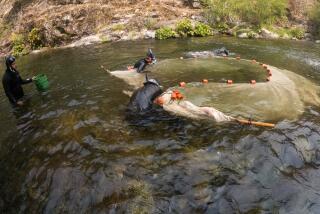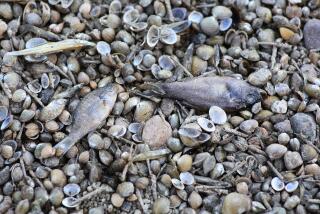Grab your paddle! Rafting heaven predicted at these 7 spots in California
Thanks to that cursed (long-may-it-rest-in-peace) drought, it has been five years since the snowpack in California’s mountains was anything for rafters and kayakers to get excited about around this time of year.
But El Niño changed that, and rafting companies in the Golden State – and beyond – say the most recent snow surveys show there will be plenty of water in the West’s rivers for boaters to enjoy.
Big snowpack in the Sierra means rafting trips will be offered all summer long on the Kern and South Fork of the American rivers.
“The April 1 snowpack surveys showed near normal snowpack totals in the Northern and Central Sierra, so things are definitely looking up,” said Steve Markle of OARS, a rafting company in Angels Camp.
According to the state Department of Water Resources, the water content is running about 87% of the historical average. Last year at this time, the snowpack stood at 5% of normal, and the mountains were all but bare.
“It’s not quite the Godzilla El Niño season we were hoping for, but still a remarkable improvement from the last four years,” Markle said. “Here’s the only thing people really need to understand, though: Anything above an 85% snowpack in the Sierra equals awesome conditions for whitewater rafting.”
1. The Kern River: The river offers the closest rafting to Los Angeles, guide Matt Volpert said, and this season looks highly promising. His company was unable to offer any trips on the Kern in 2014 or 2015 because of the drought.
“El Niño was good to us, and we’re excited about this year,” said Volpert, whose family owns Kern River Outfitters in Wofford Heights, Calif.
Volpert said the upper stretch of the Kern will have good flows the entire summer and the lower section should be boatable into the middle of August.
As for the remote and very technical Forks of the Kern stretch, no trips have been scheduled yet, but that section of the river should have good flows in May and perhaps June, depending on snowmelt and runoff.
2. North Fork of the Stanislaus River: Class IV-plus (very technical skills needed on these areas) on this section of the Stanislaus River – which runs into Calaveras Big Trees State Park near Arnold -- should be runnable through April because it is dependent on low-elevation snow melt.
3. North Fork of the American River: He said the emerald-green Class IV North Fork near Auburn, one of the classic free-flowing Sierra runs, is expected to have good flows through April and possibly into May if temperatures remain mild or the area gets more rain or snow this month.
“These rivers are dependent on low-elevation snow melt, so you have to get on them when the getting’s good,” he said.
4. Merced River: Another free-flowing spring run, the Merced River outside of Yosemite National Park offers Class III-IV roller coaster thrills and is expected to run through mid-June this year. At high water, he said the Merced serves up 10-foot-tall wave trains.
5. Tuolumne River: High flows will be the rule on the Tuolumne River near Yosemite at least through the end of May, with reliable water all summer long, he noted. At anything above 4,000 cubic feet per second (cfs), a swim test may be required, he said.
And those who want to run the river above 8,000 cfs should be “adventuresome and athletic.” He said his company has run the river with customers at flows at more than 10,000 cfs.
6. South Fork of the American River: On this river section near Sacramento, California’s most popular whitewater rafting river, upstream reservoirs are at capacity and should have good flows six days a week through Labor Day and up to four days per week in September.
“Normally a great river for families with kids as young as 7-years-old, people should expect higher flows and increased minimum age requirements on the South Fork through Memorial Day. This is a completely different river at higher levels and a guaranteed thrill ride.”
7. Middle Fork of the American River: Elsewhere in the Sierra, the Class IV Middle Fork of the American River near Auburn should be in play 6 or 7 days per week from Memorial Day through Labor Day because of dam-release flow. This stream – home to the notorious “Tunnel Chute” – will have a more-limited schedule through the end of September, he said.
8. Other rivers in the West: Farther afield, Jason Kruger, with Idaho-based ROW Adventures Co., said the Northern Rockies received lots of snow this winter, which means the numerous rivers they run in Montana, Oregon and Idaho will have plenty of water this season.
Kruger said guides are especially excited to be able to raft streams they haven’t done in nearly five years, such as the Owyhee and Bruneau rivers – both of which run through the high-desert country of southeastern Oregon and southern Idaho, respectively.
Zach Collier, whose ECHO rafting company runs the Middle Fork of the Salmon River in Idaho and the Rogue River in Oregon, said the mountains that feed both of these streams had above-normal snowfall this year.
Collier, whose company is located in Hood River, Ore., said the snowpack in the Salmon River Mountains above the Middle Fork is 117% of average, while the snowpack that drains into the Rogue stands at 107%.
The Middle Fork is undammed, so the big snowpack means the upper section may be runnable later into the summer. For the Rogue, which has reliable flows due to upstream dams, Collier said the bountiful snowpack means side creeks and waterfalls “will be even more spectacular.”
MORE
Celebrating America’s national parks
Utah: Bryce and Zion national parks by day, posh resort stay by night
Honolulu: 6 perfect places to watch free fireworks over Waikiki Beach
Coming to Western Australia’s coast: swimming with humpback whales
More to Read
Sign up for The Wild
We’ll help you find the best places to hike, bike and run, as well as the perfect silent spots for meditation and yoga.
You may occasionally receive promotional content from the Los Angeles Times.






